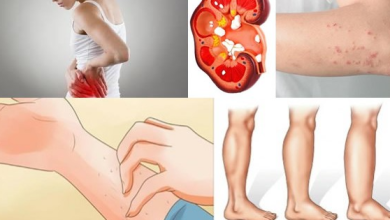1. Yellow Skin

If you notice a yellow tint to your skin or the whites of your eyes, it could be a sign of jaundice, often linked to liver issues. This condition arises when there is an excess of bilirubin in your system, indicating that your liver may not be functioning properly. It’s essential to consult a healthcare professional if you observe these symptoms.
2. White Dots on Nails

White spots on your nails, known as leukonychia, can signal deficiencies in essential nutrients such as protein, calcium, or zinc. While they are often harmless and may result from minor injuries, persistent spots could indicate a more significant nutritional imbalance.
3. Blisters and Cracks on Lips

Blisters or cracks around your lips can be signs of dehydration or an allergic reaction to certain lip products. Chronic dryness may also lead to painful sores. Additionally, clubbed fingernails—where the tips of your fingers enlarge—can be associated with respiratory or digestive conditions, so it’s worth discussing with a doctor if you notice changes.
4. Mouth Sores

Sores in your mouth, or canker sores, can result from stress, hormonal fluctuations, or a deficiency in vitamin B-12 and other nutrients. If these sores are recurrent or particularly painful, it may be beneficial to explore underlying causes with a healthcare provider.
5. White Eyelid Pimples (Styes)

Styes appear as red, swollen lumps near your eyelashes and can be caused by blocked oil glands, dry skin, or even diabetes. If you frequently develop styes, consider evaluating your skincare routine and overall health, and consult a professional if the problem persists.
6. Corneal Ring (Arcus Senilis)

A gray or white ring around the cornea of the eye, known as arcus senilis, can be a normal part of aging but may also indicate high cholesterol levels. If you’re under 40 and notice this ring, it’s advisable to discuss it with your doctor as it could signal an increased risk for heart disease.
7. Persistent Fatigue

While everyone experiences tiredness from time to time, persistent fatigue that interferes with daily life can indicate underlying health issues, such as anemia, thyroid disorders, or chronic fatigue syndrome. It’s important to assess other accompanying symptoms and consult a healthcare professional if fatigue becomes a regular concern.
8. Changes in Bowel Habits

Significant changes in bowel habits, such as persistent diarrhea or constipation, can signal digestive issues or more serious conditions like irritable bowel syndrome (IBS) or even colorectal cancer. If you notice these changes lasting more than a couple of weeks, it’s crucial to seek medical advice.
Staying attuned to these bodily symptoms can empower you to take charge of your health. Always consult a healthcare professional if you have concerns about any symptoms, as early detection and intervention can lead to better health outcomes. Remember, your body is always communicating—are you listening?







